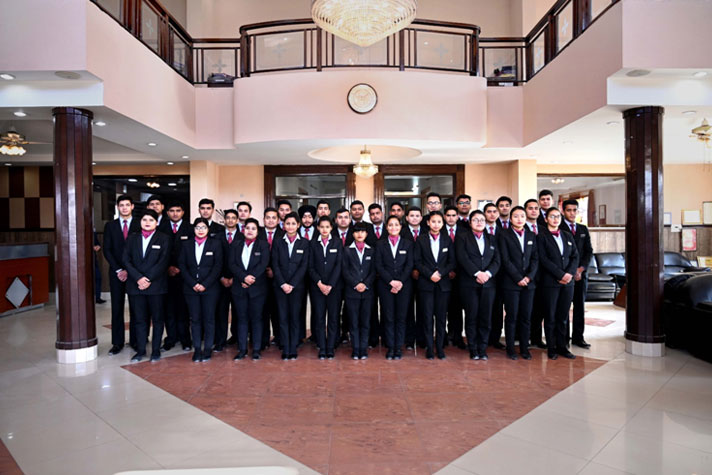- Admissions: +91 9411 170 000, 9410 555 555
- Training & Placement: +91 9760 013 434, 9760 013 535
A Master in Hotel Management pave the way to a dynamic and rewarding career in the vibrant hospitality industry. With an ever-growing demand for skilled professionals who can navigate the complexities of hospitality management, pursuing a master's degree in this field offers countless benefits.
A Masters in hotel management furnishes individuals with essential skills and specialized knowledge for excelling in various aspects of hospitality operations. From understanding hotel finance and revenue management to mastering the art of customer service and guest satisfaction, this degree program covers a wide range of subjects crucial for effective management within the industry. Masters degree holders gain insights into industry trends, emerging technologies, and best practices, empowering them to make informed decisions and drive success in their careers.

Moreover, a master's degree provides opportunities for hands-on experience and practical learning through internships, industry projects, and case studies. This experiential learning builds a strong professional network within the hospitality industry. By working alongside experienced professionals and mentors, students gain invaluable industry insight and practical knowledge that are instrumental for career advancement.
A Masters's degree in Hotel Management from Kukreja Institute of Hotel Management is a two-year program course which is distributed over four semesters which may vary in different universities but mostly the subjects offered are as follows:

The course is a professional course. The students are required to undergo industrial training in the 4th semester if they wish to opt for a master's degree in Hotel Management from the Kukreja Institute of Hotel Management. The objective of the training is to introduce the students to the operational aspects of a star hotel (4 stars and above) and he/she is preferably exposed to the four core departments especially to gain operational and managerial skills required to effectively manage a hotel. the minimum duration of training is six months.
Moreover, a Masters in Hotel Management gives lots of job opportunities, degree holders can pursue leadership roles in various segments of the industry, including hotels, resort potential, restaurants, event management companies, and tourism organizations. Whether aspiring to become hotel managers, revenue managers, food and beverage directors, or hospitality consultants, a master's degree provides the necessary qualifications and credibility to thrive in competitive job markets.
Additionally, earning a master's degree in hotel management from the Kukreja Institute of Hotel Management can lead to increased earning and career advancement opportunities. According to industry reports, professionals with advanced degrees tend to earn higher salaries and are more likely to secure managerial positions with greater responsibilities and benefits. By investing in their education and acquiring specialized skills, individuals can position themselves for long-term success and upward mobility within the hospitality industry.
Moreover, a master's degree in Hotel Management from the Kukreja Institute of Hotel Management offers opportunities for specialization and professional development tailored to individual career interests and goals. Whether focusing on luxury hospitality, sustainable tourism, event management, or culinary arts, students can choose from a variety of elective courses and concentration areas to customize their learning experience. This flexibility enables them to develop expertise in niche areas of the industry and differentiate themselves in the job market.
Furthermore, pursuing a master's degree in Hotel Management provides a global perspective and exposure to international hospitality trends and practices. With the hospitality industry becoming increasingly interconnected and diverse, having cross-cultural competency and global awareness is essential for succeeding in today’s multicultural work environments. Many Masters programs offer opportunities for international exchange programs, study tours, and collaborations with industry partners worldwide, allowing students to gain firsthand experience in different cultural contexts and expand their professional horizons.
Institute of Hotel Management are:
Increased Earning Potential –Professionals with advanced degrees according to surveys and salary reports tend to earn significantly higher salaries and bonuses.
Specialized Knowledge and Skills- Students acquire in-depth knowledge of industry-specific concepts, theories, and practices through comprehensive coursework, seminars, and practical exercises.
Customization and Flexibility- Student can choose from a variety of elective courses, concentrations, and experiential learning opportunities to customize their degree and enhance their expertise in niche areas of the industry.
Practical Experience and Industry Exposure: Many Master programs incorporate hands-on learning experiences, such as internships, externships, industry projects, and site visits, which provide students with valuable insights into real-world hospitality operations. By working closely with industry professionals and mentors, students gain practical skills, industry-specific knowledge, and networking opportunities that prepare them for a successful career in hospitality management.
Career Advancement and Opportunities for Leadership: Graduates of Masters programs in Hotel Management are well-positioned to pursue leadership roles and managerial positions in various sectors of the hospitality industry. Whether aspiring to become hotel managers, department heads, general managers, or hospitality consultants, a master's degree enhances their credentials and credibility, making them competitive candidates for leadership positions with greater responsibilities, autonomy, and advancement opportunities.
Global Perspective and Cross-Cultural Competency: Masters programs in Hotel Management often emphasize global perspectives and multicultural awareness, preparing graduates to excel in diverse and international hospitality environments. Through international exchange programs, study abroad opportunities, and collaborations with global industry partners, students gain exposure to different cultural practices, business models, and market dynamics, enhancing their cross-cultural competency, adaptability, and global mindset. This global perspective is increasingly valuable in an interconnected world where hospitality professionals must navigate cultural nuances and cater to the needs of a diverse clientele. Overall, pursuing a Masters in Hotel Management offers a comprehensive education, practical experience, and numerous opportunities for career advancement, specialization, and global position, making it a valuable investment for individuals aspiring to excel in the dynamic and rewarding field of hospitality management.
BENEFITS OF MASTER IN HOTEL MANAGEMENT IN A FIVE-STAR HOTEL
A Master's in Hotel Management can be a significant asset for individuals pursuing careers in five-star hotels, as it equips them with the advanced knowledge, skills, and credentials needed to excel in leadership roles within the luxury hospitality sector. Here's how the
1. Strategic Leadership: Graduates of Masters programs in Hotel Management from the Kukreja Institute of Hotel Management possess a deep understanding of strategic management principles, enabling them to contribute to the development and implementation of long-term business strategies in five-star hotels. They can analyze market trends, competitor behavior, and guest preferences to identify opportunities for growth, innovation, and differentiation within the luxury hospitality segment.
2. Guest Experience Management: Masters degree holders are well-versed in the art of guest experience management, which is paramount in five-star hotels known for their exceptional service standards. They understand the importance of personalized service, attention to detail, and anticipating guest’s needs to create memorable experiences that exceed expectations.
3. Revenue Optimization: With a strong foundation in revenue management and financial analysis, Masters's degree holders play a crucial role in maximizing revenue and profitability for five-star hotels. They can develop pricing strategies, manage inventory, and leverage data analytics to optimize room rates, occupancy levels, and revenue streams across various hotel departments, such as rooms, food and beverage, spa, and events.
4. Operational Excellence: Master degree holders possess the operational acumen needed to ensure smooth and efficient hotel operations in a five-star environment. They can streamline workflows, implement best practices, and maintain high standards of cleanliness, safety, and quality throughout the property.
5. Employee Development: Masters degree holders are equipped to lead and inspire teams of hospitality professionals, fostering a culture of excellence, teamwork, and continuous improvement within the hotel. They understand the importance of employee training, development, and empowerment in delivering exceptional service and building strong guest relationships. By investing in staff development programs, mentoring initiatives, and performance feedback mechanisms, they cultivate a skilled and motivated workforce dedicated to upholding the hotel’s five-star standards.
6. Innovation and Sustainability: Master degree holders bring fresh perspectives and innovative ideas to five-star hotels, driving initiatives related to sustainability, environmental stewardship, and social responsibility. They can implement eco-friendly practices and green initiatives
In summary, and with my 25 years of experience in this industry, my Masters in Hotel Management empowers individuals to excel in leadership roles within five-star hotels by leveraging their strategic insights, guest-centric approach, revenue management expertise, operational excellence, employee development skills, and commitment to innovation and sustainability.